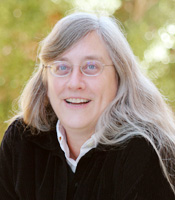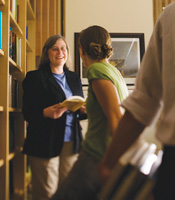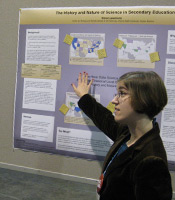February 29, 2012
Q&A with Jane Maienschein

Jane Maienschein

Dr. Maienschein advises students involved in history and philosophy of science projects.

A student presents her history of science project at an annual meeting of AAAS.
Jane Maienschein is a Distinguished Sustainability Scientist at the Global Institute of Sustainability; a Regents’ Professor, President’s Professor, and Parents Association Professor at the School of Life Sciences (College of Liberal Arts and Sciences); director of the Center for Biology and Society; and adjunct senior scientist at the Woods Hole Marine Biological Laboratory. She specializes in the history and philosophy of biology and the way that biology, bioethics, and biopolicy play out in society. In 2010 she was named a CASE and Carnegie Foundation U.S. Professor of the Year.
How did you become involved with sustainability in your career?
I never thought of my work as connected with sustainability, since my primary research field is the history and philosophy of developmental biology. It wasn’t until I was nominated to be a Distinguished Sustainability Scientist and began working with Ann Kinzig in the Global Institute of Sustainability that I thought more about where the idea of sustainability comes from, what it means in changing contexts, and why it matters. Subsequently, I was encouraged to write on the history of sustainability for the AAAS members’ website, and that led to a project examining the history of biodiversity and sustainability.
What is your most important sustainability-related project now?
I’ve been working with a collaborative group at the Marine Biological Laboratory in Woods Hole, Massachusetts, to develop a repository for digital content on the history and philosophy of science. A new project along these lines focuses specifically on biodiversity and sustainability. This project will teach ASU undergraduate and graduate students to research and write peer-reviewed articles about the change agents who helped transform these fields. The articles will then be linked to related digital content – pictures, videos, interviews, and other articles – and also to the rich published literature of both the Biodiversity Heritage Library consortium and the E.O. Wilson-inspired Encyclopedia of Life, both of which are partners in the project. In addition, ASU’s Manfred Laubichler and Robert Page are leading a related project to connect this work on biodiversity and sustainability to the Global Classroom (a project funded by the Mercator Foundation), so that international teams will develop associated content to add to the collection. These collaborations will bring together research and learning in the best possible way and involve a mix of students and faculty members.
How will your sustainability-related work affect policy or other decisions?
My work in 1997-1998 as a Congressional Fellow and senior science advisor showed me that influencing decisions is a subtle process and results are difficult to trace. In fact, we often have the greatest impact when we simply provide those in power with research materials and ideas. This is a different approach than most researchers seek, but it is consistent with my conviction that education is a long-term process and the greatest impacts tend to come later rather than sooner. But if we can get students, members of the public, and even ourselves to continually ask the hard questions and push for better answers, we will have succeeded.
What world sustainability challenge concerns you most?
Willful ignorance. By that I mean the persistent efforts by some people to sow doubt and create confusion when there should be none – for example, the people who deny evidence of human-caused climate change. This is deplorable. If the facts are bleak, let’s face them. If they call for hard answers and hard work, let’s get moving.
February 29, 2012
« Previous Researcher | Next Researcher »

